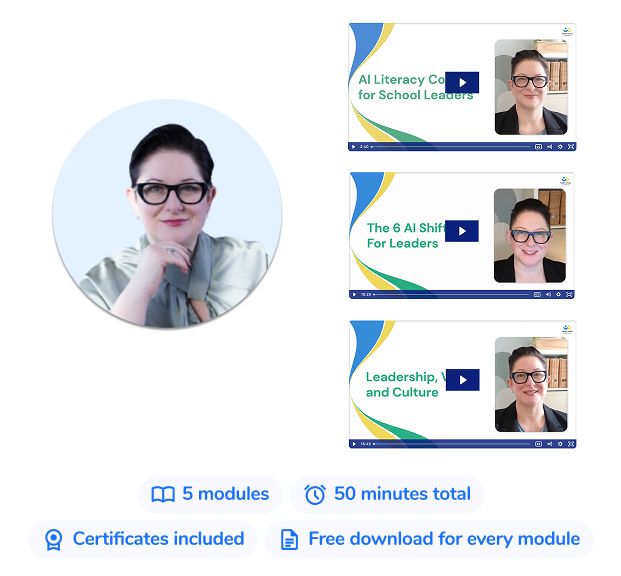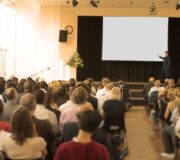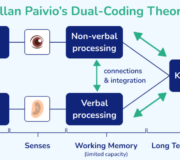Formative And Summative Assessment: The Differences Explained For Teachers
Formative assessment and summative assessment monitor progress and drive student learning. Both types of assessment help teachers adapt teaching and learning to identify strengths and areas for improvement for individuals or whole cohorts.
In this article, we explore the differences between formative and summative assessment. We’ll discuss when, why and how to get the best out of each to keep progressing students’ learning.
Let’s start with a brief overview, followed by a detailed examination.
Formative vs summative assessments – what is the difference?
Formative assessment is low stakes and designed to identify students’ current understanding; it informs teachers about the next teaching steps. Summative assessment is higher stakes and used at the end of a unit to evaluate student learning against a standard or benchmark.
There are several nuances around this definition which we explore below.
The Ultimate Guide to Maths Assessments
This guide offers a breakdown of primary and secondary maths assessments, with proven strategies and free resources to use in the classroom.
Download Free Now!HOW THIRD SPACE LEARNING EMBEDS FORMATIVE ASSESSMENT IN EVERY LESSON
Formative assessment is essential before, during, and after any intervention to ensure it effectively targets the individual needs of each student. This has always been a core principle of Third Space Learning’s one-to-one online maths tuition programmes.
Throughout their learning journey with Skye, Third Space’s AI maths tutor built by teachers and maths experts, pupils begin each lesson by answering a question that diagnoses their understanding of the topic they will be covering during the session. This is known as the ‘skill check in’ for that topic.
If a pupil struggles with the skill check in, Skye guides them through scaffolded slides, providing step-by-step instruction. It models similar examples and works through guided questions before encouraging independent practice and challenge. If the pupil demonstrates readiness and answers it correctly, Skye moves directly to the independent practice and challenge part of the lesson.
Formative assessment continues throughout the lesson as Skye identifies misconceptions and adjusts hints in real time to support learning.
Each lesson concludes with a brief summative assessment called the Skill Check-Out, which reviews understanding and tracks progress over time, and a confidence check.
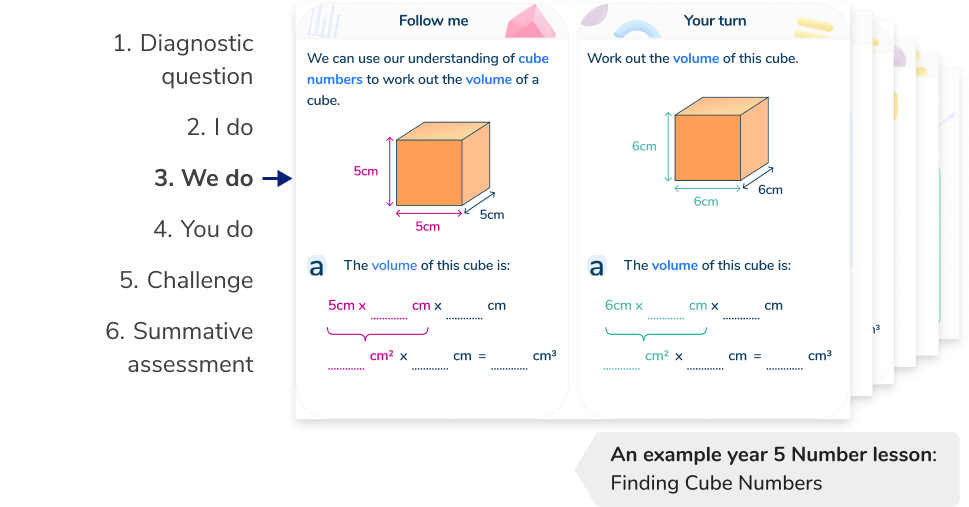
What is formative assessment?
Formative assessment is the use of day-to-day assessments to gauge and explore students’ understanding of a topic. These assessments determine student needs, which teachers use to form learning outcomes in order to prioritise student achievement and success.
Formative assessments are one of the teaching strategies used to help inform the learning ‘in the moment’. Formative assessment is continuous, informal and should have a central and pivotal role in every maths classroom. It can be thought of as an assessment for learning.
If used correctly, it will have a high impact on current learning and help you guide your instruction and teaching by giving ongoing feedback on students’ progress.
Low-stakes assessments help pupils develop skills and confidence before attempting high-stakes summative assessments. It also makes room for self-assessment and provides a baseline for measuring progress.
What is summative assessment?
Summative assessment takes place after pupils’ have completed a block of work, whether that be on a term or modular basis. They are a more formal way to sum up pupil progress and are often compared against a standard benchmark.
They are best thought of as assessments of learning.
There are different types of summative evaluations that we carry out ‘after the event’, often periodic (rather than continuous), and they are often measured against a set standard.
Summative assessment can be thought of as helping to validate and ‘check’ formative assessment – it is a periodic measure of how learners are, overall, progressing in their mathematics learning.
Read more: Summative assessment
A breakdown of the differences between formative and summative assessments
Formative and summative assessments differ in several key ways:
- Purpose: the purpose of formative assessments is to improve learning whereas the purpose of summative assessments is to gain a measure of attainment (e.g. a final grade).
- Frequency: formative assessments occur regularly throughout lessons whereas summative assessments occur at the end of a teaching-learning cycle or class.
- Type of assessment: formative assessments are typically low-stakes whereas summative assessments are high-stakes.
- Outcome: following formative assessments, teachers provide feedback to improve learning. Summative assessments result in a final grade or score used as a measure of attainment.
Importantly, the form of the assessment does not determine whether it is formative or summative. Instead, it is determined by how the assessment is used.
For example, ‘test-style questions’ can serve as formative assessments, like exit tickets at the end of a lesson, or summative assessments, such as end-of-unit tests.
In all subjects, especially maths, we use a combination of both assessment strategies. However, formative assessment, due to its constant nature, constitutes the bulk of our assessment activities.
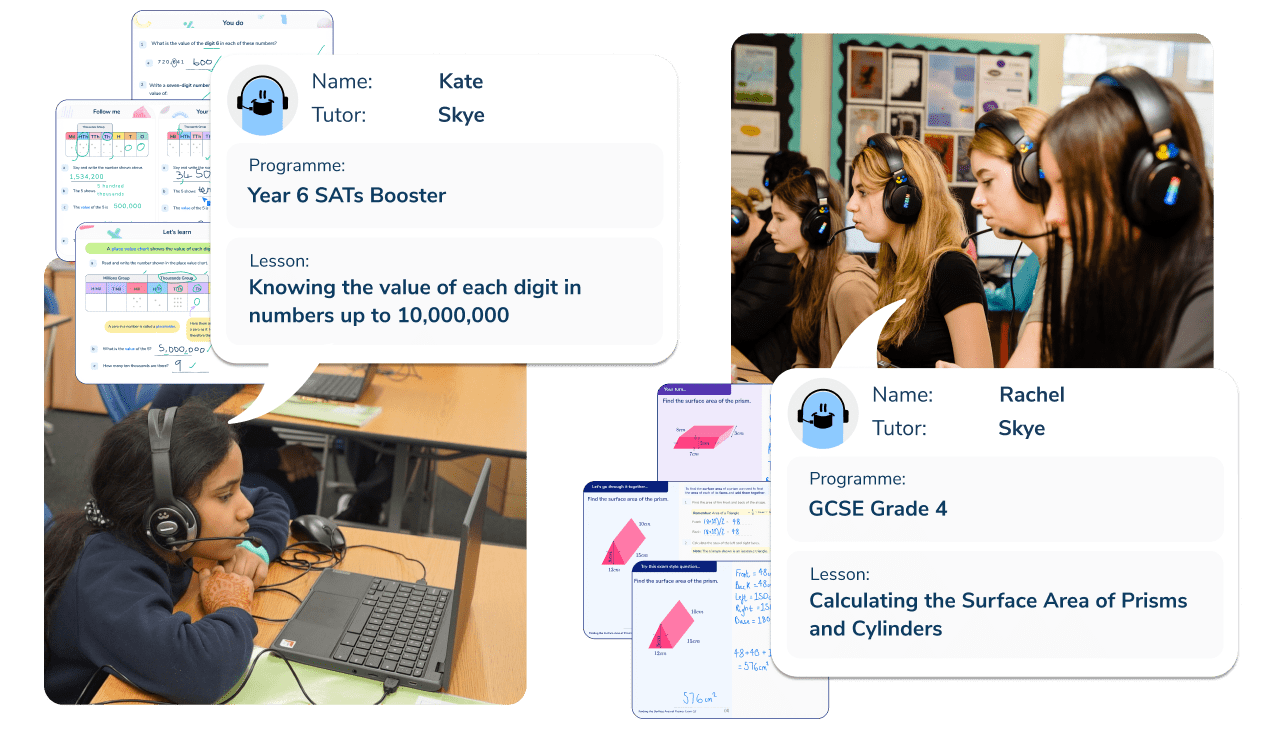
Meet Skye, the voice-based AI tutor making maths success possible for every student.
Built by teachers and maths experts, Skye uses the same pedagogy, curriculum and lesson structure as our traditional tutoring.
But, with more flexibility and a lower cost, schools can scale online maths tutoring to support every student who needs it.
Watch Skye in actionFormative vs summative assessment comparison
This venn diagram clearly shows the differences and similarities between the two assessment types.
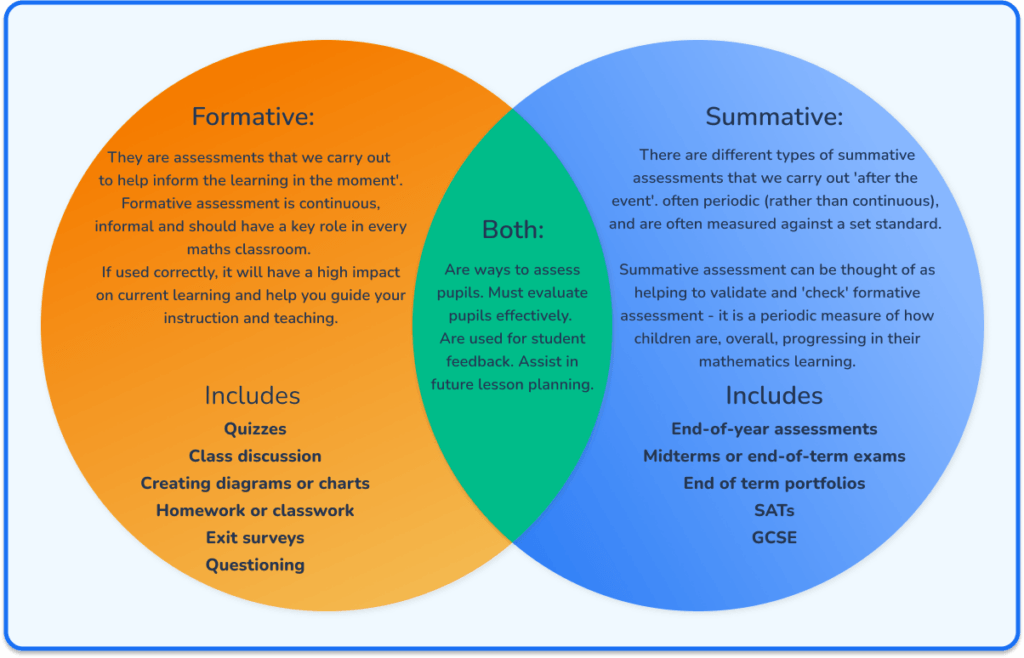
Formative assessment: what you need to know
Formative assessment is an intrinsic part of both teaching and pupil progression. This form of assessment does not rely upon tests and results, but rather the ability to adapt to classroom blockers as they arise.
It should indicate what constitutes good work and why. It also allows teachers to identify areas in students’ knowledge that need improvement and to act upon them.
Good formative feedback helps teachers and pupils plan the next stages of progression and set future learning goals together.
How to use formative assessments in your lessons
During a lesson, all adults in the classroom should be on a ‘constant assessment mission’ through interactions with pupils.
Teachers should be moving around the room, interacting with each child, and assessing their progress towards the learning objective.
In the moment assessment can take many forms:
- You could ask your pupils a series of carefully selected diagnostic questions to assess where to pitch the next stages of the lesson and determine which pupils would benefit from more support.
- Perhaps you are using a hinge question in a class discussion to assess where you need to pitch the independent, group, or whole class work, or which children require further support.
- You could use exit tickets to assess children’s understanding at the end of a lesson.
Every in-the-moment assessment should have a purpose. Use the information obtained to understand students’ strengths, weaknesses, and learning processes, and adapt future lesson plans
Ask yourself:
- If your assessment shows that children are secure, how will you deepen their learning?
- If your assessment shows that children have some misconceptions, how will you address these?
Types of formative assessment: Examples and ideas
There are many types of formative assessments to support your maths class and track pupil progression.
Common examples of formative assessment include:
- Group activities
- Quizzes
- Diagnostic tests or pre-assessments
- Multiple-choice questions
- Games
- Class projects
- Presentations
Read more: Formative assessment examples
Practical tips for implementing formative assessment
1. Ensure every formative assessment routine has a purpose
If you are going to do the ‘maths lesson classic’ and ask children to show you an answer on a mini-whiteboard, make sure you are looking at the answers from all children.
Use these to inform the next step in your lesson and the learning for each child.
I have observed many lessons where teachers used the mini-whiteboard routine but did not review the responses and continued with their planned lesson.
Remember – it is not the activity or thing that you do that represents effective assessment, but the subsequent decision-making and what you do with the information you gather from it.
It is through effective, in-lesson, formative evaluation that you ensure that each child is supported and challenged, and that every child is learning rather than constantly rehearsing what they already know.
Read more: Adaptive teaching
2. Address the learning gaps and don’t leave potholes
I often use a ‘pothole’ analogy with the schools I work with. Imagine a local council was filling in potholes but that their road maintenance vehicles were creating new holes in the road.
They wouldn’t be doing a very good job at improving the overall quality of the road surface would they?
Similarly, schools often carry out various interventions to fill gaps from previous years but inadvertently create new gaps.
Use in-the-moment and end-of-lesson assessments to address emerging gaps. At the end of the maths lesson, check all children are secure with the objective and intervene if necessary.
If you do not address the gaps now, who is and when?
Read more: Same day interventions
3. Understand diagnostic assessment and how it works
A multiple choice diagnostic assessment is probably the most effective type of assessment. This is when you set up your formative assessment in a deliberate way to diagnose the precise learning gaps and misconceptions that each of your students may have.
Each carefully selected incorrect option for your multiple choice answers can highlight a particular maths misconception. This design ensures that students can answer correctly only if they clearly understand the topic, free from any misconceptions.
This format benefits student understanding and is efficient for teachers, allowing for quick marking and immediate feedback.
Questions can be answered quickly, typically within ten seconds, allowing frequent use without taking up valuable learning time. Regular use of diagnostic assessment tools encourages students to reflect on their learning and identify areas needing further study.
Download a free diagnostic maths test for primary or secondary maths to get you started.
Summative assessment: what you need to know
Types of summative assessment: Examples and ideas
Summative assessment demonstrates pupils’ success in meeting specific goals. It quantifies student performance and achievement, providing a numerical basis for the next step.
Examples of summative assessment in primary school include:
- End-of-term or end-of-year tests
- Teachers graded reports home to parents
- Practice papers
- End-of-term projects
- Optional KS1 SATs
- Compulsory KS2 SATs
Examples of summative assessment in secondary school include:
- External examinations and qualifications, such as GCSEs and A-Levels
- Externally-marked assessments, such as CATs
- Tests at the end of a unit of work to measure attainment of taught content
- Departmental assessments occurring at the end of term or year
- Tests which feed into progress monitoring (e.g. at reporting points)
Practical tips for implementing summative assessment
However, whilst the principles of summative assessment are simple, there are 4 key points you need to consider before implementing it.
1. Understand the difference between your assessment framework and your assessment system
Despite the power of ‘in the moment’ formative assessment, schools do need a way to track the attainment and progress of children throughout the school.
Schools must consider the assessment framework or assessment rubric used for evaluation. This decision is often made at the school or trust level.
At this point, you need to be clear about the difference between your assessment system and the framework you are using.
Often, schools mention using various websites and/or apps, such as Classroom Monitor, Target Tracker, or School Insights for assessment. These assessment systems allow you to record and track children’s progress against the chosen assessment framework.
They are tools for recording, not conducting, assessments
These assessment systems are great teaching resources as they allow you to select (and often create) your own framework to assess your children – these frameworks are vitally important.
2. Consider the balance of objectives and targets in your assessment framework
When choosing or creating an assessment framework, balance the objectives and target areas of mathematics within the framework.
For example, a common occurrence is that schools assess against each objective on the national curriculum. However, this is problematic and often creates unwelcome ‘surprises’ when comparing teacher assessments against standardised summative assessments.
An example of this is SATs tests – I have been asked to work with many schools where their assessment against the whole national curriculum does not match pupil performance on previous SATs papers.
The disparity arises because the national curriculum is not weighted the same as the KS2 end of key stage assessment (SATs).
KS2 test frameworks show a clear weighting towards number based objectives.
Number, calculations and proportionality make up between 75-85% of a child’s final result.
Yet, most year groups have around a 50/50 split between ‘number’ objectives (number, calculations and proportionality) and ‘non-number’ objectives (shape, space, measures and statistics).
This essentially means that a child could be legitimately marked as ‘secure’ or ‘working at aged-related expectations’ against the whole national curriculum, on the basis of their strength in shape, space, measures and statistics. However, they wouldn’t be classed as ‘secure’ or ‘working at age-related expectations’ in a standardised test.
It is therefore important that whatever framework you use is balanced, and represents the weighting of objectives in the test frameworks.
There are many ways in which you can do this, including:
- In-built weighting functions in assessment systems.
- Assess against key objectives only, which overall, have the balance of number vs non-number objectives.
- Group objectives together, creating the overall numbers vs non-number balance.
- Use a commercially available assessment framework which has the weighting work done for you.
TOP 20 MATHS REVISION TOPICS FOR KS2 SATS
Every year Third Space Learning updates their detailed detailed analysis of past papers to determine the topics that have appeared most often on the Standardised Assessment Tests (SATs) at the end of year 6 as well as the numbers of marks allocated to these topics.
This list informs the order of lessons we teach on our one to one SATs revision programme which every year supports thousands of children to achieve their best outcomes in SATs.
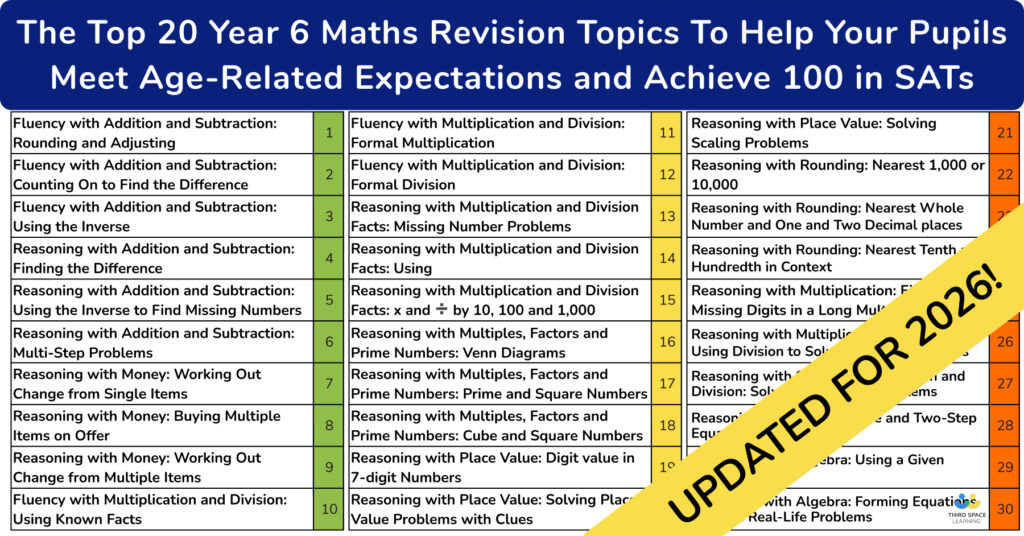
READ MORE: Top 20 topics for your year 6 SATs revision
At secondary school, the GCSE exam board frameworks mirror the weighting at primary school towards number.
With many more strands to test the marks in final exams are more fairly divided across algebra, geometry and ratio and proportion. Only probability and statistics tend to be regularly responsible for fewer marks across the 3 GCSE maths papers.
For a more detailed read on marks and topics across content domains and strands at GCSE, read this regularly updated question and topic level analysis of all edexcel GCSE maths papers.
GCSE MATHS 2026: STAY UP TO DATE
Join our email list to stay up to date with the latest news, revision lists and resources for GCSE maths 2026. We’re analysing each paper during the course of the 2026 GCSEs in order to identify the key topic areas to focus on for your revision.
GCSE dates 2026
GCSE results (2026 when available)
Get ahead on revision with the GCSE maths papers analysis from 2025:
Analysis of GCSE Maths Paper 1 2025
Analysis of GCSE Maths Paper 2 2025
GCSE Maths Paper Analysis and Summary 2025
GCSE Maths Teacher Survey Results 2025
3. Train your teachers how to use the assessment framework
Once your school decides on an assessment framework, next comes the question of how it is used.
These frameworks can be used both in a purely summative or formative way that leads to, over time, an accurate summative assessment.
Traditionally, schools use these frameworks to assess each child at set points, such as termly or midterm exams.
However, your framework is set up to ensure that all teachers fully understand it and can accurately and consistently apply it.
How to use the frameworks formatively as well as summatively
These frameworks can be used formatively with teachers recording progress towards objectives as they are taught.
An example of this is recording and amending judgements each week as a result of the ‘ongoing’ assessment. This leads to an ever-changing snapshot of each child’s performance, which can be really powerful.
This can be used to inform interventions and subsequent teaching, and help to identify common misconceptions, giving the assessment framework used by your school both a summative and formative use.
It is reassuring that many schools favour teacher assessment to provide this ‘data’.
Teacher assessment is incredibly powerful and gives teachers the professional autonomy they deserve.
4. Regular standardised tests can be used with your assessment framework
Many schools will also use some form of testing alongside their assessment frameworks.
This can help validate teacher assessment judgements, and ensure there are no ‘nasty’ surprises when it comes to Year 6.
However, testing is only as good as the quality of the tests used As we know, the development of SATs tests takes 3 years. These tests are standardised and use a ‘scaled score’.
Make sure that the tests your schools rely on also have the same degree of work that has gone into their development.
They should be standardised – so you know how children across the country perform, and be based on a clear test development framework, and have been trialled and refined in schools.
Some popular tests developed this way include PUMA (by Hodder/Rising Stars Assessment), NFER tests and GL Assessments.
In a test by Rising Stars using PUMA assessment data, pupils who received one to one tuition from Third Space Learning made double the expected progress over 14 weeks.
Regardless of which tests are used, schools and teachers will understand that they provide a snapshot of the performance on the day the test was taken. Children, like adults, have ‘good’ and ‘bad’ days, and these tests should be seen as a supplement to good quality teacher assessment, not a replacement.
Formative vs summative assessments – pros and cons
Both formative and summative assessments play important roles in the classroom and schools. Find the right balance between the two approaches for your class’s learning needs.
Constant formative assessment can prove difficult if not implemented properly, but consistent assessment of pupils’ strengths and weaknesses can prove invaluable in helping them to progress.
Summative assessments often don’t show the whole picture of a pupil’s progression. But that are a fantastic method for collecting a data-driven overview of pupil progression.
The goal of this article was to summarise the difference between formative and summative assessment, and the conclusion is that both approaches have their flaws, but they can also provide valuable insight into how a class is getting on throughout the school year. All that is left is to use assessments of both kinds to inform your teaching!
Formative assessment provides teachers with information to inform the process of teaching and learning whereas summative assessment is more product-oriented; it provides information about a pupils’ learning and understanding at the end of an instructional period.
Examples of formative assessment include: exit tickets, the use of mini-whiteboards, self- and peer-assessments. Examples of summative assessments include: end of unit projects, essays, exams and tests. They could also include standardised assessments such as SATs, GCSEs and A-levels.
Quizzes can be used for either formative or summative purposes. If a quiz is used to inform teaching and learning during an instructional period, it’s formative. If a quiz is used to evaluate a students’ learning at the end of a unit or instructional period, it’s summative.
DO YOU HAVE STUDENTS WHO NEED MORE SUPPORT IN MATHS?
Skye – our AI maths tutor built by teachers – gives students personalised one-to-one lessons that address learning gaps and build confidence.
Since 2013 we’ve taught over 2 million hours of maths lessons to more than 170,000 students to help them become fluent, able mathematicians.
Explore our AI maths tutoring or find out about maths intervention programmes for your school.
